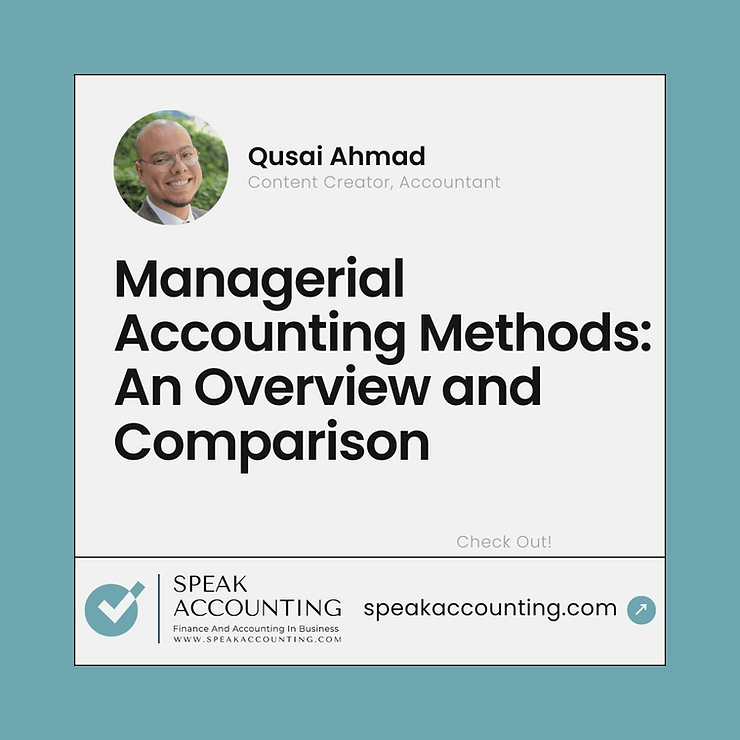Managerial accounting is the process of identifying, measuring, analyzing, interpreting, and communicating financial information to managers to pursue an organization’s goals.
Unlike financial accounting, which is mainly concerned with reporting the company’s financial performance to external parties, such as investors and creditors, managerial accounting is focused on providing useful information to internal users, such as managers and employees, to help them make better business decisions.
What You Will Learn
In this blog post, you will learn:
- The main objectives and benefits of managerial accounting
- The difference between managerial accounting and financial accounting
- The common techniques and tools used by managerial accountants
- The skills and qualifications required to become a managerial accountant
The Objectives and Benefits of Managerial Accounting
The primary objective of managerial accounting is to help managers plan, control, and evaluate the company’s operations and performance. Managerial accounting provides relevant and timely information that can help managers:
- Set goals and budgets for the company and its departments
- Monitor and measure the progress and results of the company’s activities
- Identify and analyze the problems and opportunities facing the company
- Make informed and effective decisions to improve the company’s efficiency and profitability
- Communicate and coordinate with other managers and stakeholders within the company
Some of the benefits of managerial accounting are:
- It enables managers to align their actions with the company’s strategic vision and mission
- It enhances the quality and accuracy of the company’s financial reporting and disclosure
- It improves the accountability and transparency of the company’s management and governance
- It fosters a culture of continuous improvement and innovation within the company
- It increases the competitive advantage and value of the company in the market
The Difference Between Managerial Accounting and Financial Accounting
Managerial accounting and financial accounting are two branches of accounting that serve different purposes and audiences. The main differences between them are:
- Managerial accounting is intended for internal users, such as managers and employees, while financial accounting is intended for external users, such as investors and creditors.
- Managerial accounting is flexible and adaptable to the specific needs and preferences of each manager and department, while financial accounting is standardized and regulated by accounting principles and rules, such as GAAP or IFRS.
- Managerial accounting is focused on the future and provides forward-looking information, such as forecasts and budgets, while financial accounting is focused on the past and provides historical information, such as income statements and balance sheets.
- Managerial accounting is more detailed and granular and provides information on the individual products, activities, and segments of the company, while financial accounting is more aggregated and consolidated and provides information on the overall performance and position of the company.
The Common Techniques and Tools Used by Managerial Accountants
Managerial accounting relies on a variety of techniques and tools to collect, process, and present financial information to managers. Some of the common techniques and tools used by managerial accountants are:
- Cost accounting: Cost accounting is the process of determining and allocating the costs of the company’s products and services. Cost accounting helps managers to understand the profitability and efficiency of the company’s operations and to make decisions regarding pricing, production, and inventory management.
- Budgeting: Budgeting is the process of preparing and approving a plan for the company’s revenues and expenses for a given period. Budgeting helps managers to set goals and expectations for the company and its departments and to monitor and control the actual performance against the budget.
- Variance analysis: Variance analysis is the process of comparing the actual results of the company’s operations with the budgeted or expected results and identifying and explaining the causes and effects of the differences. Variance analysis helps managers to evaluate the performance and effectiveness of the company and its departments and to take corrective actions if needed.
- Capital budgeting: Capital budgeting is the process of evaluating and selecting the long-term investments and projects that the company will undertake. Capital budgeting helps managers to allocate the company’s scarce resources to the most profitable and strategic opportunities and to measure the return on investment and the risk of each project.
- Performance measurement: Performance measurement is the process of assessing and reporting the results and outcomes of the company’s operations and activities. Performance measurement helps managers to communicate and demonstrate the value and impact of the company to its stakeholders and to reward and motivate employees and managers.
The Skills and Qualifications Required to Become a Managerial Accountant
Managerial accounting is a challenging and rewarding career that requires a combination of technical and soft skills. Some of the skills and qualifications required to become a managerial accountant are:
- A bachelor’s degree in accounting, finance, or a related field
- A professional certification, such as the Certified Management Accountant (CMA) or the Chartered Global Management Accountant (CGMA)
- A strong knowledge of accounting principles, concepts, and standards, such as GAAP or IFRS
- A proficiency in accounting software, such as QuickBooks, Sage, or Oracle
- An ability to analyze, interpret, and communicate financial information in a clear and concise manner
- An aptitude for problem-solving, critical thinking, and decision-making
- A familiarity with the industry, market, and business environment of the company
- A willingness to learn, adapt, and innovate in a dynamic and competitive setting
- A high level of integrity, ethics, and professionalism
Conclusion
Managerial accounting is an essential function that supports and enhances the management and governance of the company. Managerial accounting provides valuable information and insights that help managers to plan, control, and evaluate the company’s operations and performance and to make informed and effective decisions that align with the company’s goals and vision.
Managerial accounting also contributes to the quality and reliability of the company’s financial reporting and disclosure and to the accountability and transparency of the company’s management and governance. Managerial accounting is a rewarding and challenging career that requires a combination of technical and soft skills and a professional certification.




